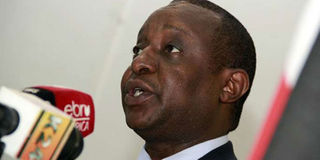Office of budget a good idea if it can improve management at Treasury

National Treasury CS Henry Rotich during the official opening of the public hearings for the financial year 2016/17 and medium term budget, on November 18, 2015 at the Kenya Institute of Curriculum Development. President Uhuru Kenyatta has proposed the creation of an office of budget management. PHOTO | DIANA NGILA | NATION MEDIA GROUP
What you need to know:
Currently, there is no independence between those who allocate resources, those who implement projects, and those who oversee.
Clearly, the current system breaks all rules of modern corporate governance.
When it comes to public policy, laws that impede efficient delivery of services to the people must be constantly changed and modified.
So, where did the idea of an office of management of budget, which President Uhuru Kenyatta broached in a policy statement he pronounced recently, come from?
Who is the president likely to appoint to this powerful docket? Are we likely to end up with duplication of functions with the Treasury?
Is this new animal a response to recent failure by the Treasury to meet revenue collection targets, difficulties in rolling out this financial year’s domestic borrowing programme, or the controversy around the proceeds of the Eurobond that we floated last year?
The air is rife with rumours and unsubstantiated claims. One school of thought sees it as part of subtle battles for power between the URP and TNA factions of the Jubilee administration. Then there are those who say that it is all about a palace war between factions of key economic advisers.
IDEA BORROWED FROM THE US
I choose to look at the bigger picture. The key thing is how an office of budget management is likely to impact — in the long term — the management of the country’s economic affairs regardless of whoever is sitting in State House.
I think the idea has been borrowed from the US, which has an Office of Management of Budget at the White House, the National Treasury, and a Congressional Budget Office.
Having adopted a presidential system under the new Constitution, creating an office of management of budget would appear to be a logical consequence.
In presidential systems, the president sits at the apex of economic policy-making, setting goals for standards and performance on budget execution while leaving the National Treasury with the responsibility of implementing the budget and managing the country’s finances.
CBK ANALOGY
The best analogy I can find is the relationship between the Central Bank of Kenya and the National Treasury.
The Central Bank is an independent body charged with keeping inflation low.
Nobody interferes with it in its discharge of monetary policy. However, it does not set its own inflation target.
The way I see it is that if we adopt the proposal by the president, the CEO of the country will, for example, give the Treasury a budget deficit target and then be in a position to judge performance against the set standards.
I do not see this as an assault on the powers and responsibilities of the National Treasury.
Rather, I see it as an attempt to de-concentrate the powers of the remaining pillar of the centralised system of government
IMPERIAL TREASURY
We say that the Constitution ended the imperial presidency.
The evidence and experience, after two years of experimenting with devolution, is that one emperor remains standing — the National Treasury.
It allocates budget for itself and other ministries, monitors expenditure against the budgets it has set, conducts internal audits for itself and other ministries, and is the overall parent of the external auditor — the Auditor General.
Thus, there is no independence between those who allocate resources, those who implement projects, and those who oversee.
Clearly, the current system breaks all rules of modern corporate governance.
The person who steers the boat must be different from the team rowing it to give the vessel forward thrust.
We can only wait to see the structure of the office of management of budget that President Kenyatta will present to us.
PUBLIC POLICY
Expect huge resistance from the existing bureaucracy. They will invoke the fact that the Public Finance Management Act gives the powers of budgeting to the Treasury.
When it comes to public policy, laws that impede efficient delivery of services to the people must be constantly changed and modified.
Despite the fact that the Act stipulates that we must have a single Treasury account (TSA), we have not had one for several years.
That is why the government keeps 10,000 accounts holding billions in commercial banks but still goes to the market every week to borrow its own money.
It invokes the Act when it serves its purpose. When will we start getting regular financial statements from ministries?
Is there any chance that we will one day see a consolidated financial statement of the whole government?
The National Treasury has enough work. Let budget policies go to an independent agency.





